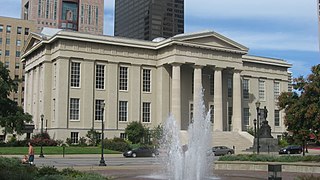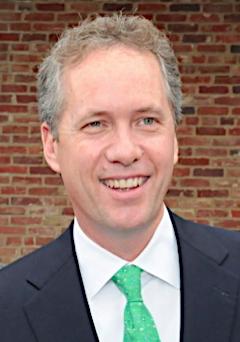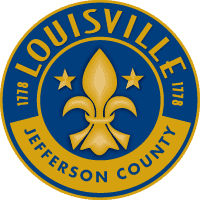
Louisville is the most populous city in the Commonwealth of Kentucky, sixth-most populous city in the Southeast, and the 27th-most-populous city in the United States. By land area, it is the country's 24th-largest city, although by population density, it is the 265th most dense city. Louisville is the historical county seat and, since 2003, the nominal seat of Jefferson County, on the Indiana border.

Jefferson County is located in the north central portion of the U.S. state of Kentucky. As of the 2020 census, the population was 782,969. It is the most populous county in the commonwealth.

Jerry Edwin Abramson is an American Democratic politician who was the 55th lieutenant governor of Kentucky. On November 6, 2014, Governor Steve Beshear announced that Abramson would step down from his position as lieutenant governor to accept the job of Director of Intergovernmental Affairs in the Obama White House. He was replaced by former State Auditor Crit Luallen.
The Louisville Board of Aldermen was the legislative branch of government for the City of Louisville prior to its merger with Jefferson County in 2003. It comprised twelve wards.

The Louisville Metro Police Department (LMPD) began operations on January 6, 2003, as part of the creation of the consolidated city-county government in Louisville, Kentucky, United States. It was formed by the merger of the Jefferson County Police Department and the Louisville Division of Police. The Louisville Metro Police Department has been headed by Jacquelyn Gwinn-Villaroel since January 2, 2023. LMPD divides Jefferson County into eight patrol divisions and operates a number of special investigative and support units. The LMPD is currently negotiating a consent decree with the United States Department of Justice (DOJ) subsequent to a 2023 investigation by the DOJ that concluded that the LMPD engaged in a decades long pattern of civil rights abuses.
David Lawrence Armstrong was an American politician. He served as the mayor of Louisville, Kentucky from 1999 to 2003. He was the city's last mayor before its merger with Jefferson County to form Louisville Metro.

The government of Louisville, Kentucky, headquartered at Louisville City Hall in Downtown Louisville, is organized under Chapter 67C of the Kentucky Revised Statutes as a First-Class city in the state of Kentucky. Created after the merger of the governments of Louisville, Kentucky and Jefferson County, Kentucky, the city/county government is organized under a mayor-council system. The Mayor is elected to four-year terms and is responsible for the administration of city government. The Louisville Metro Council is a unicameral body consisting of 26 members, each elected from a geographic district, normally for four-year terms. The Mayor is limited to a two consecutive term limit, while members of the Louisville Metro Council are not term limited.

The Louisville Metro Hall is the center of Louisville, Kentucky's government. It currently houses the Mayor's Office and the Jefferson County Clerk's Office for marriage licensing, delinquent tax filings, and the deeds room. The building was placed on the National Register of Historic Places in 1972. Construction began in 1837, and both the City of Louisville and Jefferson County governments starting using it in 1842.

Colonial Gardens is a restaurant complex and local landmark located in the Kenwood Hill neighborhood of Louisville, Kentucky, across New Cut Road from Iroquois Park. It was formerly an entertainment complex, and in its earliest existence, a part of Senning's Park, the site of the first zoo in Louisville.

The 2010 mayoral election in Louisville Metro took place on November 2, 2010, alongside other federal, state and local elections.

Gregory Edward Fischer is an American businessman and entrepreneur who served as the second mayor of Louisville Metro from 2011 to 2023. In 2019, he was elected vice president of the U.S. Conference of Mayors, and in 2020, he served as its president.

Lesbian, gay, bisexual, and transgender (LGBT) persons in the U.S. commonwealth of Kentucky still face some legal challenges not experienced by other people. Same-sex sexual activity is legal in Kentucky, although the state legislature has not repealed its sodomy statute for same-sex couples. Same-sex marriage is legal in Kentucky under the U.S. Supreme Court ruling in Obergefell v. Hodges. The decision, which struck down Kentucky's statutory and constitutional bans on same-sex marriages and all other same-sex marriage bans elsewhere in the country, was handed down on June 26, 2015.

The Fairness Campaign is a Louisville, Kentucky-based lobbying and advocacy organization, focusing primarily on preventing discrimination on the basis of sexual orientation and gender identity. The Fairness Campaign is recognized by the IRS as a 501(c)(4) organization. The organization is a member of the Equality Federation.
One Touch Make Ready is the various statutes and local ordinances passed by various local governments and utilities in the United States, which require the owners of utility poles to allow a single construction crew to make changes to multiple utility wires.

Attica Woodson Scott is an American politician who served as a member of the Kentucky House of Representatives from the 41st district from 2017 to 2023.
On March 13, 2020, Breonna Taylor, a 26-year-old African-American woman, was fatally shot in her Louisville, Kentucky apartment when at least seven police officers forced entry into the apartment as part of an investigation into drug dealing operations. Three Louisville Metro Police Department (LMPD) officers—Jonathan Mattingly, Brett Hankison, and Myles Cosgrove—were involved in the shooting. Taylor's boyfriend, Kenneth Walker, was inside the apartment with her when the plainclothes officers knocked on the door and then forced entry. The officers said that they announced themselves as police before forcing entry, but Walker said he did not hear any announcement, thought the officers were intruders, and fired a warning shot at them. The shot hit Mattingly in the leg, and the officers fired 32 shots in return. Walker was unhurt but Taylor, who was behind Walker, was hit by six bullets and died. During the incident, Hankison moved to the side of the apartment and shot 10 bullets through a covered window and glass door. According to police, Taylor's home was never searched.

The Breonna Taylor protests were a series of police brutality protests surrounding the killing of Breonna Taylor. Taylor was a 26-year-old African-American woman who was fatally shot by plainclothes officers of the Louisville Metro Police Department on March 13, 2020. Police were initially given "no-knock" search warrant, but orders were changed to "knock and announce" before the raid. Taylor's boyfriend, Kenneth Walker, who was inside the apartment with her during the raid, said he thought the officers were intruders. He fired one shot, hitting officer Mattingly in the leg, and the officers fired 32 shots in return, killing Taylor.

The 2022 Louisville mayoral election was the sixth quadrennial Louisville Metro mayoral election, held on November 8, 2022. Incumbent Democratic mayor Greg Fischer is term-limited and cannot seek reelection to a fourth term in office.
Keturah Herron is an American politician from Kentucky. They are a Democrat and represent District 42 in the State House. When elected in 2022, they were the first out LGBTQ+ member in the Kentucky House of Representatives. They are only the second out member of the Kentucky General Assembly following Ernesto Scorsone, former state senator, who came out while in office in 2003. After Scorsone left the legislature in 2008, there was no LGBTQ+ representation in either chamber until Herron. Herron is also only the third Black woman to be in the Kentucky state legislature.
















